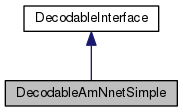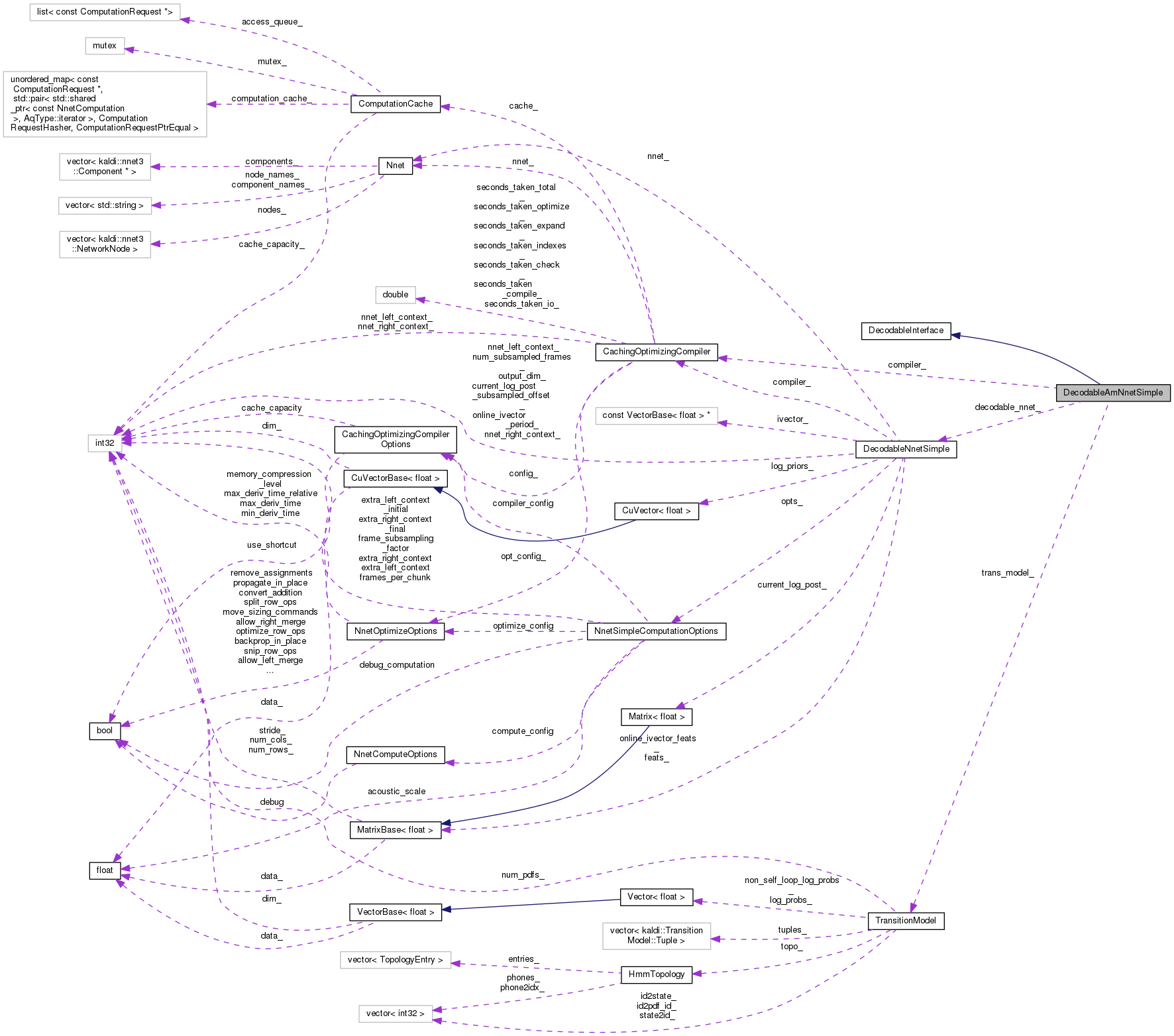#include <nnet-am-decodable-simple.h>


Public Member Functions | |
| DecodableAmNnetSimple (const NnetSimpleComputationOptions &opts, const TransitionModel &trans_model, const AmNnetSimple &am_nnet, const MatrixBase< BaseFloat > &feats, const VectorBase< BaseFloat > *ivector=NULL, const MatrixBase< BaseFloat > *online_ivectors=NULL, int32 online_ivector_period=1, CachingOptimizingCompiler *compiler=NULL) | |
| This constructor takes features as input, and you can either supply a single iVector input, estimated in batch-mode ('ivector'), or 'online' iVectors ('online_ivectors' and 'online_ivector_period', or none at all. More... | |
| virtual BaseFloat | LogLikelihood (int32 frame, int32 transition_id) |
| Returns the log likelihood, which will be negated in the decoder. More... | |
| virtual int32 | NumFramesReady () const |
| The call NumFramesReady() will return the number of frames currently available for this decodable object. More... | |
| virtual int32 | NumIndices () const |
| Returns the number of states in the acoustic model (they will be indexed one-based, i.e. More... | |
| virtual bool | IsLastFrame (int32 frame) const |
| Returns true if this is the last frame. More... | |
 Public Member Functions inherited from DecodableInterface Public Member Functions inherited from DecodableInterface | |
| virtual | ~DecodableInterface () |
Private Member Functions | |
| KALDI_DISALLOW_COPY_AND_ASSIGN (DecodableAmNnetSimple) | |
Private Attributes | |
| CachingOptimizingCompiler | compiler_ |
| DecodableNnetSimple | decodable_nnet_ |
| const TransitionModel & | trans_model_ |
Definition at line 282 of file nnet-am-decodable-simple.h.
| DecodableAmNnetSimple | ( | const NnetSimpleComputationOptions & | opts, |
| const TransitionModel & | trans_model, | ||
| const AmNnetSimple & | am_nnet, | ||
| const MatrixBase< BaseFloat > & | feats, | ||
| const VectorBase< BaseFloat > * | ivector = NULL, |
||
| const MatrixBase< BaseFloat > * | online_ivectors = NULL, |
||
| int32 | online_ivector_period = 1, |
||
| CachingOptimizingCompiler * | compiler = NULL |
||
| ) |
This constructor takes features as input, and you can either supply a single iVector input, estimated in batch-mode ('ivector'), or 'online' iVectors ('online_ivectors' and 'online_ivector_period', or none at all.
Note: it stores references to all arguments to the constructor, so don't delete them till this goes out of scope.
| [in] | opts | The options class. Warning: it includes an acoustic weight, whose default is 0.1; you may sometimes want to change this to 1.0. |
| [in] | trans_model | The transition model to use. This takes care of the mapping from transition-id (which is an arg to LogLikelihood()) to pdf-id (which is used internally). |
| [in] | am_nnet | The neural net that we're going to do the computation with; we also get the priors to divide by, if applicable, from here. |
| [in] | feats | A pointer to the input feature matrix; must be non-NULL. We |
| [in] | ivector | If you are using iVectors estimated in batch mode, a pointer to the iVector, else NULL. |
| [in] | ivector | If you are using iVectors estimated in batch mode, a pointer to the iVector, else NULL. |
| [in] | online_ivectors | If you are using iVectors estimated 'online' a pointer to the iVectors, else NULL. |
| [in] | online_ivector_period | If you are using iVectors estimated 'online' (i.e. if online_ivectors != NULL) gives the periodicity (in frames) with which the iVectors are estimated. |
| [in,out] | compiler | A pointer to a compiler [optional]– the user can declare one in the calling code and repeatedly supply pointers to it, which allows for caching of computations across consecutive decodes. You'd want to have initialized the compiler object with as compiler(am_nnet.GetNnet(), opts.optimize_config). |
Definition at line 58 of file nnet-am-decodable-simple.cc.
Returns true if this is the last frame.
Frames are zero-based, so the first frame is zero. IsLastFrame(-1) will return false, unless the file is empty (which is a case that I'm not sure all the code will handle, so be careful). Caution: the behavior of this function in an online setting is being changed somewhat. In future it may return false in cases where we haven't yet decided to terminate decoding, but later true if we decide to terminate decoding. The plan in future is to rely more on NumFramesReady(), and in future, IsLastFrame() would always return false in an online-decoding setting, and would only return true in a decoding-from-matrix setting where we want to allow the last delta or LDA features to be flushed out for compatibility with the baseline setup.
Implements DecodableInterface.
Definition at line 336 of file nnet-am-decodable-simple.h.
References KALDI_ASSERT, and KALDI_DISALLOW_COPY_AND_ASSIGN.
|
private |
Returns the log likelihood, which will be negated in the decoder.
The "frame" starts from zero. You should verify that NumFramesReady() > frame before calling this.
Implements DecodableInterface.
Definition at line 78 of file nnet-am-decodable-simple.cc.
References DecodableAmNnetSimple::decodable_nnet_, DecodableNnetSimple::GetOutput(), DecodableAmNnetSimple::trans_model_, and TransitionModel::TransitionIdToPdfFast().
|
inlinevirtual |
The call NumFramesReady() will return the number of frames currently available for this decodable object.
This is for use in setups where you don't want the decoder to block while waiting for input. This is newly added as of Jan 2014, and I hope, going forward, to rely on this mechanism more than IsLastFrame to know when to stop decoding.
Reimplemented from DecodableInterface.
Definition at line 330 of file nnet-am-decodable-simple.h.
Referenced by main().
|
inlinevirtual |
Returns the number of states in the acoustic model (they will be indexed one-based, i.e.
from 1 to NumIndices(); this is for compatibility with OpenFst).
Implements DecodableInterface.
Definition at line 334 of file nnet-am-decodable-simple.h.
|
private |
Definition at line 345 of file nnet-am-decodable-simple.h.
Referenced by DecodableNnetSimple::DoNnetComputation().
|
private |
Definition at line 346 of file nnet-am-decodable-simple.h.
Referenced by DecodableAmNnetSimple::LogLikelihood().
|
private |
Definition at line 347 of file nnet-am-decodable-simple.h.
Referenced by DecodableAmNnetSimple::LogLikelihood().